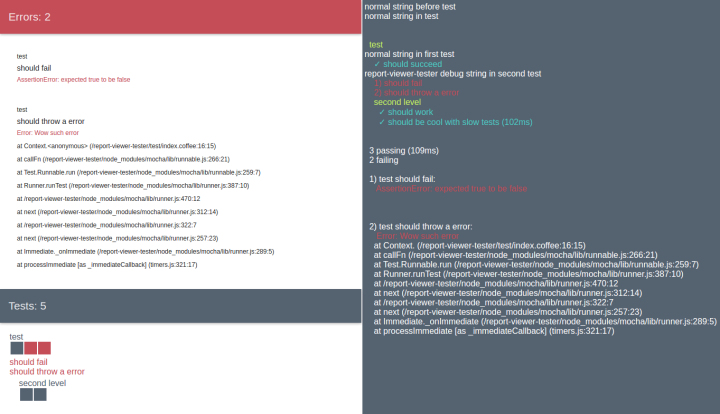README

report-viewer
A cli for piping a unit test result directly into your browser. Currently only works with mocha and the spec reporter.
Each time a test result is piped into stdio, the browser view will be updated. Uses socket.io for best experience.
No livereload needed. Errors will be shown prominently on top.
The console output will be visible in the side of the browser
Install
npm install report-viewer
Usage
Best used with mocha:
mocha --watch 2>&1 | report-viewer --opener
or
report-viewer --opener 'mocha --watch'
Both will start a webserver (localhost:9999) to view current testresults. The later one will be able to restart mocha through the webview.
Available options:
-h, --help output usage information
-V, --version output the version number
--port <n> port
--opener opens a browser
--viewer <(module-)name> loades a specific viewer
From node
runner = require("report-viewer")
mocha = require.resolve("mocha")+"/bin/mocha"
path = require("path")
specs = path.resolve(__dirname, './test')
runner({
port: process.env.PORT, # Heroku uses dynamic port assignment
args: mocha + ' ' + specs
})
Views
You can use your own view by cloning the report-viewer-default repository, rename and change it. both should work:
mocha --watch 2>&1 | report-viewer --viewer your-view
mocha --watch 2>&1 | report-viewer --viewer /path/to/your-view
If you publish your work, let me know, I will link it up
Testing
See the report-viewer-tester repository
Release History
v0.3.0: moved the parser into the view
is now able to spawn mocha on its own, allows restarts
v0.2.0: reworked the view
using spec reporter now
works with debug and console output directly into the browser window
v0.1.1: modified dependencies
v0.1.0: Moved the view into seperate bundle report-viewer-default
Largely improved the view
Console output is piped into the console of the browser
Cut on dependencies
v0.0.2: Rename to report-viewer
v0.0.1: First Release
License
Copyright (c) 2015 Paul Pflugradt Licensed under the MIT license.